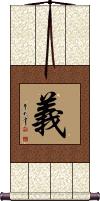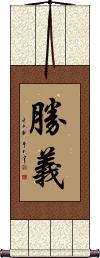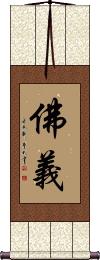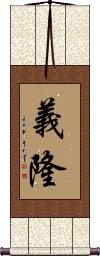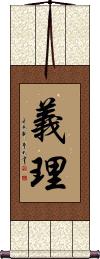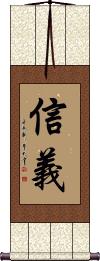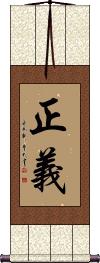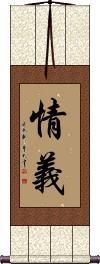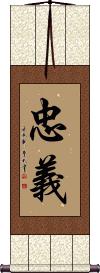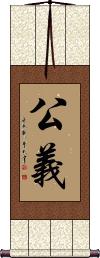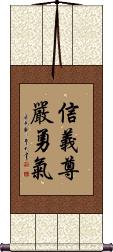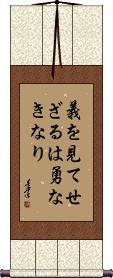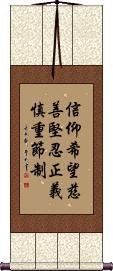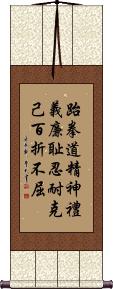Many custom options...
And formats...

義 in Chinese / Japanese...
Buy an 義 calligraphy wall scroll here!
Personalize your custom “義” project by clicking the button next to your favorite “義” title below...
1. Justice / Rectitude / Right Decision
4. Elan
5. Giri
6. Faithful / Honorable / Trustworthy / Fidelity / Loyalty
10. Righteousness
12. Italy
13. Saeed
14. Saiful
15. Sajid
16. Sayed
17. Sayeed
18. Sayyed
19. Seif
20. Syed
21. Courage to do what is right
22. Honorable Death - No Surrender
23. No Surrender
24. Hoes Before Bros
25. Love and Honor
26. Paladin
27. Better to sacrifice your life than your principles
29. Romance of the Three Kingdoms
30. Saifedinne
31. The Five Tenets of Confucius
Justice / Rectitude / Right Decision
Also means: honor loyalty morality righteousness
義 is about doing the right thing or making the right decision, not because it's easy but because it's ethically and morally correct.
No matter the outcome or result, one does not lose face if tempering proper justice.
義 can also be defined as righteousness, justice, morality, honor, or “right conduct.” In a more expanded definition, it can mean loyalty to friends, loyalty to the public good, or patriotism. This idea of loyalty and friendship comes from the fact that you will treat those you are loyal to with morality and justice.
義 is also one of the five tenets of Confucius's doctrine.
![]() There's also an alternate version of this character sometimes seen in Bushido or Korean Taekwondo tenets. It's just the addition of a radical on the left side of the character. If you want this version, click on the image to the right instead of the button above.
There's also an alternate version of this character sometimes seen in Bushido or Korean Taekwondo tenets. It's just the addition of a radical on the left side of the character. If you want this version, click on the image to the right instead of the button above.
This is also a virtue of the Samurai Warrior
See our page with just Code of the Samurai / Bushido here
Ultimate Truth
The Principles of Buddhism
In short, 佛義 is the Principles of Buddhism, but there is more (especially for the second character):
佛 is the character for the Buddha and Buddhism.
義 has deeper meanings including justice, righteousness, morality, honour/honor, teachings, doctrine, right, proper, righteous, loyalty, purpose, or meaning. So the single word “principles” is often used to encompass all these ideas.
Elan
Giri
(obligation or duty in Japanese)
This term means an obligation or a sense of duty that one may have to their employer, country or culture.
義理 is a specifically Japanese term, as in Chinese, these two characters form a word that means “religious doctrine” or refers to the argument presented in an essay.
This term has a similar meaning in Korean, where it can be translated as justice, sense of duty, loyalty, integrity, or obligation.
義理 is kind of a weird selection for a wall scroll. So this entry is intended more for educational purposes.
Faithful / Honorable / Trustworthy / Fidelity / Loyalty
信義 is a word often used to describe a person with an honest and loyal reputation.
Simply put, this applies to somebody you can trust (with your life).
In Chinese, this is often defined as good faith, honor, trust, and justice.
In Korean, this word means fidelity, truthfulness, or faithfulness.
In Japanese: faith, fidelity, and loyalty. It's also a Japanese male given name when pronounced “Nobuyoshi.”
Justice / Righteousness
正義 means justice or righteousness in Chinese, Japanese Kanji, and old Korean Hanja.
Practicing justice and righteousness is being fair.
It solves problems, so everyone wins. You don't prejudge. You see people as individuals. You don't accept it when someone acts like a bully, cheats, or lies. Being a champion for justice takes courage. Sometimes when you stand for justice, you stand alone.
Note: This is also considered to be one of the Seven Heavenly Virtues.
Love and Honor
情義 means to love and honor in Chinese. 情義 is more or less the kind of thing you'd find in marriage vows.
The first character suggests emotions, passion, heart, humanity, sympathy, and feelings.
In this context, the second character means to honor your lover's wishes and treat them justly and righteously (fairly). That second character can also be translated as “obligation,” as in the obligation a husband and wife have to love each other even through difficult times.
In the context outside of a couple's relationship, this word can mean “comradeship.”
Japanese may see this more as “humanity and justice” than “love and honor.” It's probably best if your target is Chinese.
This is the short and sweet form, there is also a longer poetic form (you can find it here: Love and Honor if it’s not on the page you are currently viewing).
Loyalty / Devotion
忠義 is another form of loyalty or devotion.
In Chinese, this is more specifically about being loyal and devoted to your friends.
In Japanese, this is more often used to mean loyalty to your country or nation.
Except for the slight difference noted above between Japanese and Chinese, this word is understood universally in Chinese, Japanese Kanji, and old Korean Hanja. It can also be used to describe devotion or fidelity.
It should be noted that this Kanji combination is being used less and less in modern Japan (this is a better choice if your audience is Chinese, though any Japanese person will clearly understand it).
Righteousness
Enlightened Truth
Italy
Saeed
Saiful
Sajid
Sayed
Sayeed
Sayyed
Seif
Syed
Courage to do what is right
見義勇為 means the courage to do what is right in Chinese.
This could also be translated as “Never hesitate to do what is right.”
This comes from Confucian thought:
Your courage should head in an honorable direction. For example, you should take action when the goal is to attain a just result as, without honorable intent, a person’s gutsy fervor can easily lead them astray.
One who flaunts courage but disregards justice is bound to do wrong; someone who possesses courage and morality is destined to become a hero.
Some text above paraphrased from The World of Chinese - The Character of 勇
Honorable Death - No Surrender
This ancient Japanese proverb can be translated as “The principle of honorable death and no surrender,” or simply “No surrender.”
If you directly translate this, you get something that means “Doctrine of suicide,” or “Ideology of honorable death.”
玉砕主義 is a specifically-Japanese proverb that embraces the long history of honorable suicide or self-sacrifice for honor in Japanese culture.
No Surrender
Honor Does Not Allow Second Thoughts
義無反顧 is a Chinese proverb that can be translated in a few different ways. Here are some examples:
Honor does not allow one to glance back.
Duty-bound not to turn back.
No surrender.
To pursue justice with no second thoughts.
Never surrender your principles.
This proverb is about the courage to do what is right without questioning your decision to take the right and just course.
Hoes Before Bros
Love and Honor
深情厚義 means to love and honor.
This is more or less the kind of thing you'd find in marriage vows.
The first two characters suggest deep love or deep emotions, passion, and feelings.
The last two characters mean generous justice or thick honor (the third character is an adjective that means generous or thick). It just means that you will honor your lover's wishes and treat them justly and righteously (fairly).
This is the longer four-character version, there is also a short and sweet two character version.
Paladin
Better to sacrifice your life than your principles
捨生取義 is a Chinese proverb that comes from the philosopher Mencius.
It can be translated in a few different ways:
To give up life for righteousness.
To choose honor over life
Better to sacrifice one's life than one's principles.
Realistic / Practical
Romance of the Three Kingdoms
Novel Title
Saifedinne
The Five Tenets of Confucius
The Five Cardinal Rules / Virtues of Confucius
仁義禮智信 are the core of Confucius's philosophy.
Simply stated:
仁 = Benevolence / Charity
義 = Justice / Rectitude
禮 = Courtesy / Politeness / Tact
智 = Wisdom / Knowledge
信 = Fidelity / Trust / Sincerity
Many of these concepts can be found in various religious teachings. It should be clearly understood that Confucianism is not a religion but should instead be considered a moral code for a proper and civilized society.
This title is also labeled “5 Confucian virtues.”
![]() If you order this from the Japanese calligrapher, expect the middle Kanji to be written in a more simple form (as seen to the right). This can also be romanized as "jin gi rei satoshi shin" in Japanese. Not all Japanese will recognize this as Confucian tenets but they will know all the meanings of the characters.
If you order this from the Japanese calligrapher, expect the middle Kanji to be written in a more simple form (as seen to the right). This can also be romanized as "jin gi rei satoshi shin" in Japanese. Not all Japanese will recognize this as Confucian tenets but they will know all the meanings of the characters.
Fidelity Honor Courage
信義尊嚴勇氣 means fidelity, honor, and courage in Chinese.
This is a word list that was requested by a customer. Word lists are not common in Chinese, but we've put this one in the best order/context to make it as natural as possible.
We used the “honor” that leans toward the definition of “dignity” since that seemed the best match for the other two words.
Please note: These are three two-character words. You should choose the single-column format when you get to the options when you order this selection. The two-column option would split one word or be arranged with four characters on one side and two on the other.
Courage To Do What Is Right
義を見てせざるは勇なきなり is a Japanese proverb that means “Knowing what is right and not doing is a want of courage.”
I've also seen it translated as:
To see what is right, yet fail to do so, is a lack of courage.
To know righteousness, but take no action is cowardice.
You are a coward if you knew what was the right thing to do, but you did not take action.
Knowing what is right without practicing it betrays one's cowardice.
Note: Because this selection contains some special Japanese Hiragana characters, it should be written by a Japanese calligrapher.
Seven Heavenly Virtues
信仰希望慈善堅忍正義慎重節制 is a list in Chinese and Japanese Kanji of an interpretation of the Seven Heavenly Virtues.
1. Faith is belief in God, and the right virtues.
2. Hope is taking a positive future view that good will prevail.
3. Charity is a concern for, and active helping of, others.
4. Fortitude is never giving up.
5. Justice is being fair and equitable with others.
6. Prudence is care of and moderation with money.
7. Temperance is moderation of needed things and abstinence from things that are not needed.
The full list is here. 信仰希望慈善堅忍正義慎重節制 is a word list, not a common phrase. While all Chinese and Japanese people will recognize the words in the list, they may not understand what the list is about (unless they are familiar with the Seven Heavenly Virtues).
don’t get this as a tattoo or anything like that without first consulting a native translator in the target language. These are fine for a wall scroll but a long discussion is needed before you commit to this for a lifetime inking commitment.
Taekwondo Tenets / Spirit of Taekwon-do
跆拳道精神禮義廉耻忍耐克己百折不屈 is General Choi's writing that is often called “The Tenets of Taekwon-do.”
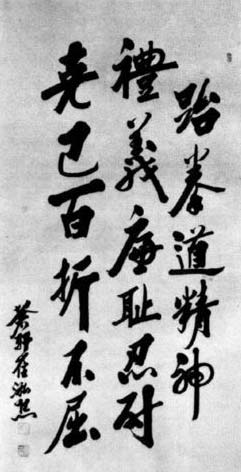
The actual title would be translated as “Taekwondo Spirit” or “The Spirit of Taekwondo.” It was originally written in Korean Hanja (Chinese characters used in Korea for about 1600 years).
General Choi's original calligraphy is shown to the right. Your custom calligraphy will be unique, and not an exact match, as each calligrapher has their own style.In modern times, the common form of written Korean is Hangul (a phonetic character set). The table below shows the text in Hangul and Hanja along with a pronunciation guide and a brief English translation:
| Traditional Korean Hanja | Modern Korean Hangul | Pronunciation | English |
| 跆拳道精神 | 태권도정신 | tae gweon do jeong sin | Taekwondo Spirit |
| 禮儀 | 예의 | ye yi | Courtesy / Etiquette / Propriety / Decorum / Formality |
| 廉耻 | 염치 | yeom ci | Integrity / Sense of Honor |
| 忍耐 | 인내 | in nae | Patience / Perseverance / Endurance |
| 克己 | 극기 | geug gi | Self-Control / Self-Denial / Self-Abnegation |
| 百折不屈 | 백절불굴 | baeg jeor bur gur | Indomitable Spirit (Undaunted even after repeated attacks from the opponent) |
| Note that the pronunciation is the official version now used in South Korea. However, it is different than what you may be used to. For instance, “Taekwon-do” is “tae gweon do.” This new romanization is supposed to be closer to actual Korean pronunciation. | |||
Not the results for 義 that you were looking for?
Below are some entries from our dictionary that may match your 義 search...
| Characters If shown, 2nd row is Simp. Chinese |
Pronunciation Romanization |
Simple Dictionary Definition |
義 义 see styles |
yì yi4 i gi ぎ |
More info & calligraphy: Justice / Rectitude / Right Decision(noun - becomes adjective with の) (1) morality; righteousness; justice; honour (honor); (noun - becomes adjective with の) (2) meaning; (noun - becomes adjective with の) (3) {Buddh} teachings; doctrine; (n,n-pref) (4) nonconsanguineous relationship (i.e. of in-laws); (n,n-pref) (5) prosthesis; (surname) Yoshimura The right, proper, righteous; loyal; public-spirited, public; meaning, significance. It is used for the Skt. artha, object, purpose, meaning, etc.; also for abhidheya. |
佛義 佛义 see styles |
fó yì fo2 yi4 fo i butsugi |
More info & calligraphy: The Principles of Buddhism |
信義 信义 see styles |
xìn yì xin4 yi4 hsin i nobuyoshi のぶよし |
More info & calligraphy: Faithful / Honorable / Trustworthy / Fidelity / Loyaltyfaith; fidelity; loyalty; (male given name) Nobuyoshi |
公義 公义 see styles |
gōng yì gong1 yi4 kung i kougi / kogi こうぎ |
More info & calligraphy: Righteousnessjustice; equity; (male given name) Masayoshi |
勝義 胜义 see styles |
shèng yì sheng4 yi4 sheng i yoshitomo よしとも |
More info & calligraphy: Ultimate TruthBeyond description, that which surpasses mere earthly ideas; superlative, inscrutable. |
忠義 忠义 see styles |
zhōng yì zhong1 yi4 chung i tadayoshi ただよし |
More info & calligraphy: Loyalty / Devotion(noun or adjectival noun) loyalty; devotion; (male given name) Tadayoshi |
情義 情义 see styles |
qíng yì qing2 yi4 ch`ing i ching i jougi / jogi じょうぎ |
More info & calligraphy: Love and Honorjustice and humanity |
正義 正义 see styles |
zhèng yì zheng4 yi4 cheng i masayoshi まさよし |
More info & calligraphy: Justice / Righteousness(1) justice; right; righteousness; (2) (usu. in titles of annotated editions of Confucian classics) correct meaning; correct explanation; (male given name) Masayoshi traditional or accepted viewpoint of one school or sect |
義理 义理 see styles |
yì lǐ yi4 li3 i li giri ぎり |
More info & calligraphy: Giri(noun - becomes adjective with の) (1) duty; sense of duty; honor; honour; decency; courtesy; debt of gratitude; social obligation; (can be adjective with の) (2) in-law; relation by marriage; (given name) Yoshimasa reason |
義隆 see styles |
yoshitaka よしたか |
More info & calligraphy: Elan |
勝義諦 胜义谛 see styles |
shèng yì dì sheng4 yi4 di4 sheng i ti shōgi tai |
More info & calligraphy: Enlightened Truth |
義大利 义大利 see styles |
yì dà lì yi4 da4 li4 i ta li |
More info & calligraphy: Italy |
三國演義 三国演义 see styles |
sān guó yǎn yì san1 guo2 yan3 yi4 san kuo yen i |
More info & calligraphy: Romance of the Three Kingdoms |
捨生取義 舍生取义 see styles |
shě shēng qǔ yì she3 sheng1 qu3 yi4 she sheng ch`ü i she sheng chü i |
More info & calligraphy: Better to sacrifice your life than your principles |
玉砕主義 see styles |
gyokusaishugi ぎょくさいしゅぎ |
More info & calligraphy: Honorable Death - No Surrender |
現実主義 see styles |
genjitsushugi げんじつしゅぎ |
More info & calligraphy: Realistic / Practical |
義侠の士 see styles |
gikyounoshi / gikyonoshi ぎきょうのし |
paladin |
義無反顧 义无反顾 see styles |
yì wú fǎn gù yi4 wu2 fan3 gu4 i wu fan ku |
More info & calligraphy: No Surrender |
見義勇為 见义勇为 see styles |
jiàn yì yǒng wéi jian4 yi4 yong3 wei2 chien i yung wei |
More info & calligraphy: Courage to do what is right |
見色忘義 见色忘义 see styles |
jiàn sè wàng yì jian4 se4 wang4 yi4 chien se wang i |
More info & calligraphy: Hoes Before Bros |
義を見てせざるは勇なきなり see styles |
giomitesezaruhayuunakinari / giomitesezaruhayunakinari ぎをみてせざるはゆうなきなり |
More info & calligraphy: Courage To Do What Is Right |
一義 一义 see styles |
yī yì yi1 yi4 i i ichigi いちぎ |
(1) one meaning; (2) primary importance; primary significance; primary consideration; (3) a reason; a truth; (personal name) Hitoyoshi one thing |
丈義 see styles |
takeyoshi たけよし |
(male given name) Takeyoshi |
三義 三义 see styles |
sān yì san1 yi4 san i miyoshi みよし |
Sanyi township in Miaoli county 苗栗縣|苗栗县[Miao2 li4 xian4], northwest Taiwan (surname) Miyoshi three meanings |
不義 不义 see styles |
bù yì bu4 yi4 pu i fugi ふぎ |
injustice (noun - becomes adjective with の) (1) immorality; injustice; misconduct; impropriety; perfidy; (noun - becomes adjective with の) (2) adultery; infidelity; cuckoldry; (noun - becomes adjective with の) (3) (archaism) (See 八虐) murdering one's teacher or a government official unjust |
両義 see styles |
ryougi / ryogi りょうぎ |
(noun - becomes adjective with の) double meaning; two meanings; amphibolous |
主義 主义 see styles |
zhǔ yì zhu3 yi4 chu i shugi しゅぎ |
-ism; ideology doctrine; rule; principle; -ism |
久義 see styles |
hisayoshi ひさよし |
(male given name) Hisayoshi |
之義 see styles |
yukiyoshi ゆきよし |
(personal name) Yukiyoshi |
也義 see styles |
naruyoshi なるよし |
(male given name) Naruyoshi |
Click here for more 義 results from our dictionary
The following table may be helpful for those studying Chinese or Japanese...
| Title | Characters | Romaji (Romanized Japanese) | Various forms of Romanized Chinese | |
| Justice Rectitude Right Decision | 義 义 | gi | yì / yi4 / yi | i |
| Ultimate Truth | 勝義 胜义 | shougi / shogi | shèng yì / sheng4 yi4 / sheng yi / shengyi | sheng i / shengi |
| The Principles of Buddhism | 佛義 佛义 | butsu gi / butsugi | fó yì / fo2 yi4 / fo yi / foyi | fo i / foi |
| Elan | 義隆 义隆 | yì lóng / yi4 long2 / yi long / yilong | i lung / ilung | |
| Giri | 義理 义理 | giri | yì lǐ / yi4 li3 / yi li / yili | i li / ili |
| Faithful Honorable Trustworthy Fidelity Loyalty | 信義 信义 | shingi | xìn yì / xin4 yi4 / xin yi / xinyi | hsin i / hsini |
| Justice Righteousness | 正義 正义 | sei gi / seigi | zhèng yì / zheng4 yi4 / zheng yi / zhengyi | cheng i / chengi |
| Love and Honor | 情義 情义 | qíng yì / qing2 yi4 / qing yi / qingyi | ch`ing i / chingi / ching i | |
| Loyalty Devotion | 忠義 忠义 | chuu gi / chuugi / chu gi | zhōng yì / zhong1 yi4 / zhong yi / zhongyi | chung i / chungi |
| Righteousness | 公義 公义 | kou gi / kougi / ko gi | gōng yì / gong1 yi4 / gong yi / gongyi | kung i / kungi |
| Enlightened Truth | 勝義諦 胜义谛 | shou gi tai shougitai sho gi tai | shèng yì dì sheng4 yi4 di4 sheng yi di shengyidi | sheng i ti shengiti |
| Italy | 義大利 义大利 | yì dà lì yi4 da4 li4 yi da li yidali | i ta li itali |
|
| Saeed | 賽義德 赛义德 | sài yì dé sai4 yi4 de2 sai yi de saiyide | sai i te saiite |
|
| Saiful | 賽義夫 赛义夫 | sài yì fū sai4 yi4 fu1 sai yi fu saiyifu | sai i fu saiifu |
|
| Sajid | 賽義德 赛义德 | sài yì dé sai4 yi4 de2 sai yi de saiyide | sai i te saiite |
|
| Sayed | 賽義德 赛义德 | sài yì dé sai4 yi4 de2 sai yi de saiyide | sai i te saiite |
|
| Sayeed | 賽義德 赛义德 | sài yì dé sai4 yi4 de2 sai yi de saiyide | sai i te saiite |
|
| Sayyed | 賽義德 赛义德 | sài yì dé sai4 yi4 de2 sai yi de saiyide | sai i te saiite |
|
| Seif | 賽義夫 赛义夫 | sài yì fū sai4 yi4 fu1 sai yi fu saiyifu | sai i fu saiifu |
|
| Syed | 賽義德 赛义德 | sài yì dé sai4 yi4 de2 sai yi de saiyide | sai i te saiite |
|
| Courage to do what is right | 見義勇為 见义勇为 | jiàn yì yǒng wéi jian4 yi4 yong3 wei2 jian yi yong wei jianyiyongwei | chien i yung wei chieniyungwei |
|
| Honorable Death - No Surrender | 玉砕主義 | gyokusai shugi gyokusaishugi | ||
| No Surrender | 義無反顧 义无反顾 | yì wú fǎn gù yi4 wu2 fan3 gu4 yi wu fan gu yiwufangu | i wu fan ku iwufanku |
|
| Hoes Before Bros | 見色忘義 见色忘义 | jiàn sè wàng yì jian4 se4 wang4 yi4 jian se wang yi jiansewangyi | chien se wang i chiensewangi |
|
| Love and Honor | 深情厚義 深情厚义 | shēn qíng hòu yì shen1 qing2 hou4 yi4 shen qing hou yi shenqinghouyi | shen ch`ing hou i shenchinghoui shen ching hou i |
|
| Paladin | 義俠の士 義侠の士 | gi kyō no shi gikyōnoshi | ||
| Better to sacrifice your life than your principles | 捨生取義 舍生取义 | shě shēng qǔ yì she3 sheng1 qu3 yi4 she sheng qu yi sheshengquyi | she sheng ch`ü i sheshengchüi she sheng chü i |
|
| Realistic Practical | 現実主義 | genjitsu shugi / genjisu syugi | ||
| Romance of the Three Kingdoms | 三國演義 三国演义 | sān guó yǎn yì san1 guo2 yan3 yi4 san guo yan yi sanguoyanyi | san kuo yen i sankuoyeni |
|
| Saifedinne | 賽義迪內 赛义迪内 | sài yì dí nèi sai4 yi4 di2 nei4 sai yi di nei saiyidinei | sai i ti nei saiitinei |
|
| The Five Tenets of Confucius | 仁義禮智信 仁义礼智信 | jin gi rei tomo nobu jingireitomonobu | rén yì lǐ zhì xìn ren2 yi4 li3 zhi4 xin4 ren yi li zhi xin renyilizhixin | jen i li chih hsin jenilichihhsin |
| Fidelity Honor Courage | 信義尊嚴勇氣 信义尊严勇气 | xìn yì zūn yán yǒng qì xin4 yi4 zun1 yan2 yong3 qi4 xin yi zun yan yong qi xinyizunyanyongqi | hsin i tsun yen yung ch`i hsinitsunyenyungchi hsin i tsun yen yung chi |
|
| Courage To Do What Is Right | 義を見てせざるは勇なきなり | giomitesezaruhayuunakinari giomitesezaruhayunakinari | ||
| Seven Heavenly Virtues | 信仰希望慈善堅忍正義慎重節制 信仰希望慈善坚忍正义慎重节制 | shinkou kibou jizen kennin seigi shinchou sessei shinko kibo jizen kennin seigi shincho sesei | xìn yǎng xī wàng cí shàn jiān rěn zhèng yì shèn zhòng jié zhì xin4 yang3 xi1 wang4 ci2 shan4 jian1 ren3 zheng4 yi4 shen4 zhong4 jie2 zhi4 xin yang xi wang ci shan jian ren zheng yi shen zhong jie zhi | hsin yang hsi wang tz`u shan chien jen cheng i shen chung chieh chih hsin yang hsi wang tzu shan chien jen cheng i shen chung chieh chih |
| Taekwondo Tenets Spirit of Taekwon-do | 跆拳道精神禮義廉耻忍耐克己百折不屈 跆拳道精神礼义廉耻忍耐克己百折不屈 | tái quán dào jīng shén lǐ yì lián chǐ rěn nài kè jǐ bǎi zhé bù qū tai2 quan2 dao4 jing1 shen2 li3 yi4 lian2 chi3 ren3 nai4 ke4 ji3 bai3 zhe2 bu4 qu1 tai quan dao jing shen li yi lian chi ren nai ke ji bai zhe bu qu | t`ai ch`üan tao ching shen li i lien ch`ih jen nai k`o chi pai che pu ch`ü tai chüan tao ching shen li i lien chih jen nai ko chi pai che pu chü |
|
| In some entries above you will see that characters have different versions above and below a line. In these cases, the characters above the line are Traditional Chinese, while the ones below are Simplified Chinese. | ||||
Successful Chinese Character and Japanese Kanji calligraphy searches within the last few hours...
